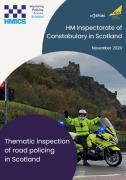HMICS PUBLISHES Thematic Inspection of the Scottish Police Authority
22nd June 2017
HMICS PUBLISHES Thematic Inspection of the Scottish Police Authority - Phase 1 Review of Openness and Transparency.
A review by HM Inspectorate of Constabulary in Scotland (HMICS) into the openness and transparency of the way that the Scottish Police Authority conducts its business has concluded that there is a need for the Authority to genuinely engage with its stakeholders and listen to the views of those with an interest in the policing of Scotland.
The inspection was brought forward at the request of the Cabinet Secretary for Justice and followed from concerns raised by the Scottish Parliament Public Audit and Post-Legislative Scrutiny Committee (PAPLS) and the Justice Sub-Committee on Policing.
Commenting on his report, HM Chief Inspector of Constabulary in Scotland said, "I have previously observed that effective scrutiny of policing in Scotland is essential in maintaining both legitimacy and public confidence. The scrutiny of policing must not only be effective, it must also be seen to be effective. While there have been positive improvements under the current Chair, the recent parliamentary scrutiny and media concerns over openness and transparency have weakened confidence in the SPA and detracted from its ability to perform its statutory function."
The report acknowledges positive signs of improvement within the SPA Board operations over the last 18 months. The relationships between the SPA and Police Scotland have improved significantly and the shared development of the Policing 2026 Strategy has been a major milestone. Other developments including improved financial reporting, investment in change management, governance of police call handling and the implementation of Board and committee workplans, are all evidence of good progress. There is also a strong commitment from the Chair and all members to support policing and drive improvement.
Commenting on the previous decision by the SPA to hold its committee meetings in private and restrict the publication of papers to the same day as its meetings, Mr Penman said, "While I recognise and fully support the need for members to have private space and receive confidential briefings in support of their role, I firmly believe that the formal scrutiny of policing in Scotland should be in public."
"There is a statutory presumption in favour of these meetings being held in public and I believe that the SPA has taken a narrow interpretation of the legislation in support of its decision to hold committee meetings in private."
“I have previously recognised the legitimate interest of the media in reporting on SPA proceedings and consider that agenda and papers should be published in advance of meetings to promote transparency and inform stakeholders and those with an interest in the policing of Scotland.”
The report welcomes the recent decision by the SPA to revert to holding its committee meetings in public and publishing papers in advance, but concludes that there is a need to listen to the views of stakeholders to maintain public confidence, and on this occasion the SPA has failed to do so until pressed by parliamentary committees. The SPA must recognise the legitimate interests of parliament, local authorities, staff associations, the press and the wider public in the scrutiny of policing in Scotland.
The report also looked at the issues arising from the recent resignation of Board Member Moi Ali and acknowledges that she acted fully in accordance with On Board guidance. It highlights that there has been an acceptance by the Chair that he did not deal with Moi Ali appropriately and that he has since made a public apology.
HMICS identified weakness in the current executive structures and welcomes the recent announcement by the Cabinet Secretary for Justice that there will be a review of the way that the SPA Board can be better supported to deliver its statutory functions.
This report is intended to support improvement and makes 11 recommendations. HMICS will request an action plan from SPA outlining how it intends to address these with agreed timescales.
Key findings:
■ There have been positive signs of improvement in SPA Board operations and relationships which reflect a genuine commitment to good governance. This is also a clear commitment from the Chair and all Board members to improving policing.
■ There is strong support for the Chair from all current Board members. They are appreciative of his leadership and the direction he has brought to the Board.
■ The Governance Review was owned by the Chair and influenced by his experience of private sector governance models.
■ There was a clear expectation amongst stakeholders that they would be consulted on the implementation of the Governance Review and have an opportunity to influence it further. This expectation was not met and many stakeholders were unhappy that the Corporate Governance Framework was not shared until after it was agreed by the Board.
■ The decision in August 2016 to allow committee Chairs to decide on whether to hold meetings in private was precipitous and should not have been implemented until the approval of the new Corporate Governance Framework.
■ The Police and Fire Reform (Scotland) Act 2012 creates a statutory presumption in favour of Board and committee meetings being held in public. The SPA has taken a narrow interpretation of the legislation in support of its decision to hold meetings in private.
■ Many stakeholders feel that the decision to hold meetings in private and withhold papers has been detrimental to their interests in the policing of Scotland and has impacted negatively on the effectiveness and legitimacy of the SPA.
■ Whilst there have been improvements between Police Scotland and local scrutiny and engagement committees, there remains an expectation that national governance arrangements through the SPA will be fully transparent to local stakeholders.
■ The negative feedback and public criticism of the SPA proposals to hold committee meetings in private and restrict the publication of papers was entirely foreseeable.
■ HMICS fully accepts the need for private discussion and the free exchange of views amongst members and with police officers, staff and other stakeholders. However, a balance must be struck between private and public meeting space to ensure that scrutiny takes place in an open and transparent way.
■ The decision to limit the publication of meeting papers to the day of a meeting was taken primarily to mitigate against issues being played out in the media before members had an opportunity to discuss. Some members believed that media coverage in advance of meetings could detract from meaningful debate at Board meetings, although HMICS acknowledges that it could equally inform members of the potential impact of their decisions.
■ HMICS does not consider that the use of an informal media embargo imposed by the SPA on the release of publicly available information is either desirable or sustainable.
■ The Chair and all Board members have a good awareness of On Board guidance, although there were differing interpretations of ‘collective' or ‘corporate' responsibility.
■ There is no evidence of systemic bullying within the SPA or concerns amongst current members.
■ HMICS finds that former Board Member Moi Ali acted fully in accordance with On Board guidance and that the Chair did not properly interpret ‘collective responsibility'.
■ There has been an acceptance by the Chair that he did not deal with former Board Member Moi Ali appropriately and he has since made public apology.
■ HMICS is unable to identify the authority under which the Chair indicated he would not nominate Moi Ali as a member for committee membership nor any formal criteria which would have justified such a decision.
■ There is a lack of clarity in the processes to be followed by the SPA when concerns are raised around a member’s conduct. These should be detailed within the SPA Standing Orders.
■ There are shortcomings in the current executive structures and the capacity of the Chief Executive, senior managers and committee support services to provide the level of expert advice and governance support to the Board. This is a fundamental weakness in SPA’s current arrangements.
■ There is dysfunction in the relationship between the Chair and Chief Executive, and there have been challenges for the Chief Executive and his senior management team in managing long-term secondments and absences. This is impacting on the effectiveness and efficiency of the SPA to perform its statutory function.
Related Businesses
Related Articles
Police - Area Performance Report to Caithness Area Committee on 11 November
A report by the police to the Caithness area committee on 11 November will allow councillors to discuss a range of issues. Chief Inspector Calum Smith - Area Commander (North Highland Area Command) sets out the crime related figures up to June 2024.Police Scotland Urged To Review Its Commitment To Road Policing
A reduction in police activity targeting the most common causes of fatal crashes has been identified as a key factor affecting Police Scotland's ability to keep people safe on the nation's roads. A new report by His Majesty's Inspectorate of Constabulary in Scotland notes that since 2020 the total number of people killed or injured on Scotland’s roads has increased each year.
A836 In Caithness - Average Speed Cameras Go Live Today Monday 2nd September
Police Scotland's North Safety Camera Unit are now operating average speed cameras on the A836 between Reay and Thurso with offences being progressed from Monday 2nd September. In partnership with the Scottish Safety Camera Programme and the Highland Council, the location was identified as having speed concerns and increased traffic volumes, both of which are potential ongoing road safety challenges.
Visiting relatives and friends this Christmas? Make sure your home is safe AFTER DARK
Consider carefully what you are putting on social media, especially if you are staying away to visit friends and relatives this Christmas. Be wary of posting photographs of Christmas parties that contain images of high value jewellery.
POLICE OFFICER RECRUITMENT - CAITHNESS AREA
Would you like to join the Police? Would you like to live and work in the Caithness area? Police Scotland is actively recruiting good quality and eligible candidates specifically for the Caithness area. We are taking applications now for Police Constable / Special Constable Entry for future intakes during 2023/2024.
£74m Police Budget Cut Will Make Communities Less Safe
UNISON, the union for police staff, says Scotland's police budget cut will see even more crime going unreported and crimes not being fully investigated. The union says around 230 police staff could be cut, including fingerprint examiners, forensic examiners, 999 call handlers, custody staff, high-speed driving instructors, cybercrime experts, payroll, HR and IT staff.New Police Commander For Highland And Islands Division Takes Oath
The new Highland and Islands divisional commander will take up post having been sworn in as a Police Scotland officer. Chief Constable Sir Iain Livingstone welcomed and thanked Chief Superintendent Rob Shepherd during a ceremony at Police Scotland Headquarters, Tulliallan, on Monday, 16 January 2023, overseen by Justice of the Peace Gillian Thomson.
Police Complaints, Investigations And Misconduct To Continue After Resignations
Gross misconduct proceedings against police officers should be allowed to continue after they resign from the force to promote transparency and maintain public confidence, according to a public consultation. The move, which would see proceedings continue even if an officer leaves during the course of an investigation into their conduct, was among the recommendations of Dame Elish Angiolini's independent review into how police complaints and allegations of misconduct should be handled.Criminal Proceedings In Scotland 2020-21
The total number of people proceeded against in Scottish courts fell by 46% to 46,497 in the year to 2020-21, according to National Statistics published by Scotland's Chief Statistician today. The number of people convicted fell at a similar rate, down 44% to 42,532.15 Further Call Handling Jobs For Police Centre In Inverness
Cllr Matthew Reiss, Highland Council's Strategic Lead for Police and Fire has welcomed Police Scotland's announcement that it has created fifteen new posts to further enhance the development of call handling services, based in Inverness. He said: "We were delighted in October last year to welcome 25 new jobs in Inverness with the creation of a specialist call handling service team and these fifteen additional new posts based in the Highlands are great news.
